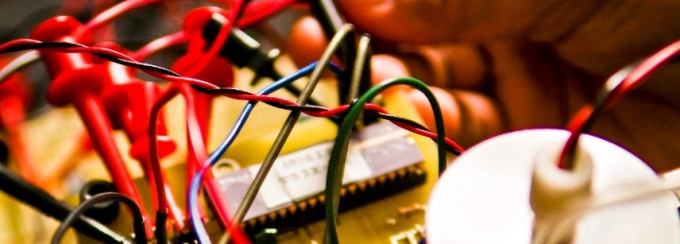Curriculum
Our curriculum is designed to prepare our graduates to immediately contribute to the workforce of the profession, and to be prepared to pursue advanced study and engage in continuous professional development.

Undergraduate Courses
The first two years of the undergraduate curriculum emphasize the physical sciences and mathematics. Additionally, fundamental classes in digital principles, circuits, and signals complete the second year. The third year consists of coordinated sequences in electronics and electronic circuits, communications and signal processing, microprocessors and microcomputers, and electromagnetic theory. Fourth-year courses are designed to reinforce lab skills, practice design, and broaden the students’ background knowledge through technical electives. Technical electives allow undergraduates flexibility to concentrate in the broad areas of energy systems, optics and photonics, communications, signal processing and networking, and solid state electronics.
Technical Electives for the EE Undergraduate Degree
During their Junior and Senior year, students may choose to enroll in Technical Electives and EE Electives of interest. EE electives allow undergraduates flexibility to concentrate in the broad areas of energy systems; optics and photonics; communications, signal processing and networking; and solid state electronics, or to concentrate on a specific theme that may combine courses from several areas.
Technical Electives: in principle, any 300 or 400 level course of technical nature may be considered as a technical elective (for example, courses from SEAS, the Department of Mathematics, the Department of Physics, and some others). Some restrictions may apply in cases in which courses have large overlap with other courses in the EE program.
EE Electives: in principle, any 300 or 400 level course from EE may be considered that is not already another required component of the EE curriculum. Some restrictions may apply in cases in which courses have large overlap with other courses in the program.
EE technical electives (by focus group): A list of EE technical electives appears below. The list is organized by focus area. Selecting courses from different focus areas is permitted, and is recommended if you are interested in perusing a multidisciplinary theme. Some potential themes of interest and their corresponding courses appear after the list of EE electives.
Please note that not all electives are offered every year. Check the UB Course Catalog and semester class schedule for availability and registration information. The semester in which the course is typically offered appears in parentheses.
EE 401 Radio Frequency (RF) and Microwave Circuits I (Fall)
EE 413 Communication Electronics (Spring)
EE 434 Principles of Networking (Spring)
EE 456 Radio Frequency (RF) and Microwave Circuits II (Spring)
EE 460 Introduction to Magnetic Resonance Imaging (Fall)
EE 484 Communications Systems II (Spring)
Special Topics Courses: EE 441, EE 450, EE 459
Individual study/internship/research EE 496-499
EE 401 Radio Frequency (RF) and Microwave Circuits I (Fall)
EE 413 Communication Electronics (Spring)
EE 421 Semiconductor Materials (Fall)
EE 423 Nanotechnology and Science (Spring)
EE 428 BioMEMS and Lab-on-a-Chip (Spring)
EE 430 Fundamentals of Solid State Devices (Spring)
EE 448 Microelectronic Device Fabrication (Fall)
EE 453 Microelectronic Fabrication Lab (Fall, Spring)
EE 456 Radio Frequency (RF) and Microwave Circuits II (Spring)
EE 457 Quantum Structure Devices (Fall)
EE 488 Fundamentals of Modern VLSI Devices (Fall)
EE 491 Analog Circuits (Spring)
Special Topics Courses: EE 441, EE 450, EE 459
Individual study/internship/research EE 496-499
EE 412 Nanophotonics (Fall)
EE 423 Nanotechnology and Science (Spring)
EE 426 Wearable and Implantable Sensors (Fall)
EE 428 BioMEMS and Lab-on-a-Chip (Spring)
EE 455 Photonic Devices (Fall)
EE 489 Lasers and Photonics (Fall)
EE 490 Consumer Optoelectronics (Spring)
Special Topics Courses: EE 441, EE 450, EE 459
Individual study/internship/research EE 496-499
EE 425 Electrical Devices I (Spring)
EE 467 Integrated Power Electronics (Fall)
EE 470 Renewable Distributed Generation & Storage Systems (Spring)
EE 476 High-Voltage Engineering (Fall)
EE 482 Power Systems Engineering I (Fall)
Special Topics Courses: EE 441, EE 450, EE 459
Individual study/internship/research EE 496-499
Some suggested themes for EE technical electives:
EE 428 BioMEMS and Lab on a Chip
EE 460 Introduction to Magnetic Resonance Imaging
EE 480 Biomedical Electronics
EE 421 Semiconductor Materials
EE 430 Fundamentals of Solid State Devices
EE 448 Microelectronic Device Fabrication
EE 453 Microfabrication Lab
EE 488 Fundamentals of Modern VLSI Devices
EE 412 Nanophotonics
EE 441 Optics and Photonics Lab
EE 453 Microfabrication Lab
EE 455 Photonic Devices
EE 489 Lasers and Photonics
EE 430 Fundamentals of Solid State Devices
EE 453 Microfabrication Lab
EE 484 Communication Systems II
EE 412 Nanophotonics
EE 421 Semiconductor Materials
EE 430 Fundamentals of Solid State Devices
EE 441 Optics and Photonics Lab
EE 453 Microfabrication Lab
EE 455 Photonic Devices
EE 457 Quantum Structure Devices
EE 489 Lasers and Photonics
Flowsheets
The EE flowsheet provides students with guidance in planning their semester's schedule. After entering the link below, please select the flowsheet applicable to your effective academic year (which refers to the academic year a student is admitted to the major).
BS Electrical Engineering Flowsheet
Please note, while efforts have been made to ensure flowsheet accuracy, final responsibility for meeting graduation requirements resides with the student. Using this tool does not take the place of meeting with your academic advisor.